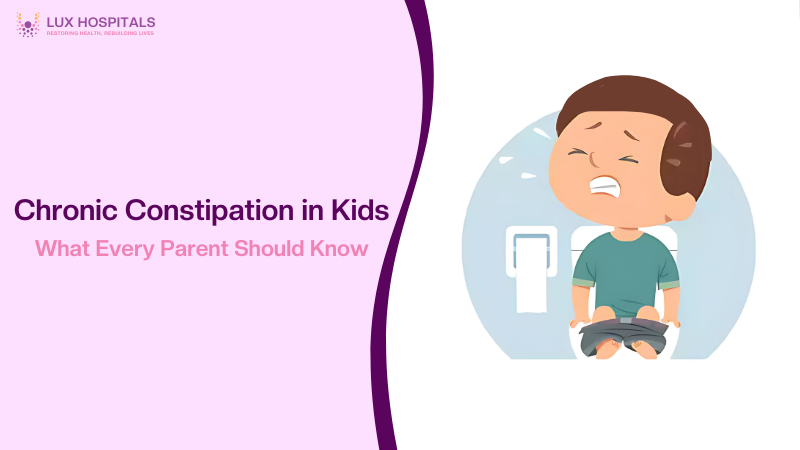Chronic Constipation in Kids: What Every Parent Should Know

As parents, we always watch for signs that our children are happy and healthy. But what happens when something as simple as going to the bathroom becomes a daily struggle? Chronic constipation in kids is more common than many realize and it’s not just about skipping a day or two without a bowel movement. It may cause discomfort if untreated. , emotional distress, and long-term issues.
This guide is here to help you understand the causes, symptoms, and treatments of chronic constipation in kids so you know what to look for and how to help your child feel better.
What Is Chronic Constipation in Kids?
Chronic constipation refers to infrequent, painful, or difficult Constant bowel movements that last for several weeks or months. In kids, chronic constipation often means fewer than three bowel movements per week, hard or large stools, and a tendency to withhold going due to pain or fear.
Chronic constipation is not a temporary problem; It can have negative impacts on a child’s quality of life if treatment is not received.
Chronic Constipation Causes in Children
There are several causes of chronic constipation, and they often overlap. Here are the most common culprits:
- Low-fiber diet: Kids who eat mostly processed or fast foods may not get enough fiber to support healthy digestion.
- Inadequate water intake: Stools that are hard by dehydration might be difficult to pass.
- Holding it in: Some children resist using the toilet due to fear, embarrassment, or distractions like playing.
- Changes in routine: Starting school, traveling, or stressful events can throw off regular bowel habits.
- Medical conditions: In rare cases, issues like hypothyroidism or Hirschsprung’s disease can cause chronic constipation symptoms.
Recognizing the Symptoms of Chronic Constipation
If your child is struggling with chronic constipation, you might notice:
- Bowel movements that occur seldom (less than three times per week)
- Painful or hard stools
- Bloating or stomach pain
- Soiling accidents (encopresis)
- Loss of appetite
- Irritability or mood changes
These chronic constipation symptoms often build up gradually, making it easy to dismiss them at first. But if these signs persist, it’s time to look closer.
Diagnosis: What to Expect
- When you visit your pediatrician, they’ll ask about your child’s bathroom habits, diet, physical activity, and medical history.
- Bowel movements that occur seldom (less than three times per week) of bloating, pain, or impacted stool.
- In some cases, further testing such as abdominal X-rays, blood work, or referral to a specialist may be necessary to better understand the causes of chronic constipation.
Chronic Constipation Treatment Options
Chronic constipation treatment is usually straightforward and highly effective when done consistently. Here’s what your doctor may recommend:
1. Dietary Changes
- Introduce more fruits, vegetables, and whole grains.
- Reduce processed foods and sugary snacks.
- Encourage fiber-rich options like pears, apples with skin, oatmeal, and legumes.
2. Staying Hydrated
- Offer plenty of water throughout the day.
- Avoid too many sugary or caffeinated drinks.
3. Physical Activity
- Promote regular play and movement.
- Reduce screen time that keeps kids sedentary.
4. Toilet Routine
- Encourage your child to sit on the toilet after meals.
- Use a footstool to support proper positioning.
- Offer positive reinforcement—not pressure.
5. Medications (if needed)
- Pediatricians may prescribe stool softeners or mild laxatives.
- Never use over-the-counter laxatives without medical advice.
Tips to Help Your Child Feel Comfortable
Managing chronic constipation in kids isn’t just about food or medicine—it’s also emotional. Kids might feel embarrassed, ashamed, or scared to discuss their discomfort.
- Keep a calm, reassuring tone.
- Normalize bathroom talk so they don’t feel embarrassed.
- Avoid blame or frustration if accidents happen.
- Track their progress together to celebrate improvements.
Chronic Constipation: Long-Term Outlook
- With early intervention, most kids recover from chronic constipation without long-term issues.
- However, if the condition is left untreated, Anal fissures, hemorrhoids, or even bowel impaction are among the consequences that may result from it.
- It’s important to remain consistent. Be patient, take medical advice, and, if you’re worried, get a second opinion.
When to See a Doctor for Chronic Constipation in Kids?
Occasional constipation is regular, but chronic constipation in kids shouldn’t be ignored. See a pediatrician or proctology specialists if:
- Symptoms last more than two weeks
- There’s blood in the stool.
- Your child experiences severe abdominal pain.
- They’re losing weight or not growing well.
Timely medical care can help eliminate serious problems and start effective chronic constipation treatment.
Conclusion
Chronic constipation in kids can be challenging, but with timely attention, supportive care, and simple lifestyle changes, most children find lasting relief. Recognizing the signs early and seeking professional help when needed can prevent complications and ease your child’s discomfort. A balanced diet, good hydration, and healthy bathroom habits go a long way. Remember, you’re not alone effective treatment options are available, and your child can feel better with the right support and guidance.
Frequently Asked Questions
Chronic constipation in children is treated with a high-fiber diet, increased water intake, regular toilet routines, physical activity, and if needed, doctor-prescribed stool softeners or laxatives.
The root cause of chronic constipation is often a combination of a low-fiber diet, inadequate fluid intake, and poor bowel habits. In some cases, underlying medical conditions or emotional stress can also contribute.
Yes, untreated chronic constipation in kids can lead to complications such as anal fissures, hemorrhoids, or stool impaction. It can also cause emotional distress or anxiety around using the bathroom.
If your child’s symptoms persist for more than two weeks, or if there is severe pain, blood in the stool, weight loss, or frequent soiling, it’s time to consult a pediatrician.
Foods rich in fiber—like apples, pears, prunes, oatmeal, and whole grains—can help relieve chronic constipation. It’s also important to limit processed foods and drink lots of water.
Yes, emotional stress or major life changes can contribute to chronic constipation in kids. Children may also withhold stool due to anxiety, embarrassment, or past painful experiences.




















